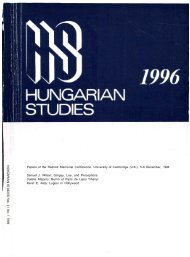The Canadian-American Review of Hungarian Studies - Vol. 4 ... - EPA
The Canadian-American Review of Hungarian Studies - Vol. 4 ... - EPA
The Canadian-American Review of Hungarian Studies - Vol. 4 ... - EPA
You also want an ePaper? Increase the reach of your titles
YUMPU automatically turns print PDFs into web optimized ePapers that Google loves.
confronting <strong>Hungarian</strong>-<strong>Canadian</strong>s. <strong>The</strong> nativistic feelings <strong>of</strong> Englishand French <strong>Canadian</strong>s, their suspicions toward certain immigrants, wasa fact which no Magyar immigrant to this country could escape. Worsestill, these antagonisms were <strong>of</strong>ten transmuted into outright discrimination.As has been mentioned, during the First World War immigrantsfrom Central and Eastern Europe were classified as "enemy aliens"andwere denied the right to vote in federal elections. In the 1920's <strong>Hungarian</strong>swere placed in the "non-preferred" category by immigrationauthorities. While some <strong>Hungarian</strong>s were victims <strong>of</strong> <strong>of</strong>ficial discrimination,others were plagued by sheer ignorance about ethnic groups. In1937, for example, an insurance company refused to provide firedamagecoverage to <strong>Hungarian</strong> farmers. Apparently, the <strong>of</strong>ficials <strong>of</strong> thefirm had confused <strong>Hungarian</strong>s with Doukhobors whose incendiaryhabits were public knowledge. 6Discrimination by governments and private companies may havehurt the immigrant's pride and pocketbook, but it probably did nothave a very damaging effect on his psyche. For many newcomers, theexperience <strong>of</strong> being mistreated by bureaucrats and employers was notentirely new. <strong>Hungarian</strong>s from the successor states had already beensubjected to similar if not worse treatment. Those directly from Hungarywere <strong>of</strong>ten also acquainted with discrimination. As impoverishedpeasants or landless labourers they had been at the bottom <strong>of</strong> theirformer country's social ladder. What most <strong>Hungarian</strong> immigrants hadnot tasted before, and what was a new and discouraging experience forthem in Canada, was what might be termed personal discrimination:rejection by co-workers, and neighbours, by people <strong>of</strong> their own socialrank and educational achievement. Such treatment, however infrequentit might have been, was a bitter pill to swallow for most<strong>Hungarian</strong>-<strong>Canadian</strong>s.If discrimination was a discouraging experience for the adult immigrant,it was even worse for his children. Born in Canada, these"hyphenated <strong>Canadian</strong>s" grew up assuming that they would be treatedas equals. <strong>The</strong>ir disappointment was all the keener when they discoveredthat, no matter how emphatically they rejected their parents'values and habits, they were not accepted as full-fledged <strong>Canadian</strong>s.<strong>The</strong> frustrations <strong>of</strong> a second-generation <strong>Hungarian</strong> yearning for acceptanceinto <strong>Canadian</strong> society are skillfully depicted in John Marlyn'snovel Under the Ribs <strong>of</strong> Death. <strong>The</strong> novel's hero, Sandor Hunyadi, hasone aim in life: to become "Alex Hunter," an English-<strong>Canadian</strong> businessman.His rejections no doubt resemble those that many <strong>Hungarian</strong>-<strong>Canadian</strong>s had experienced in striving for social and economic betterment.
















